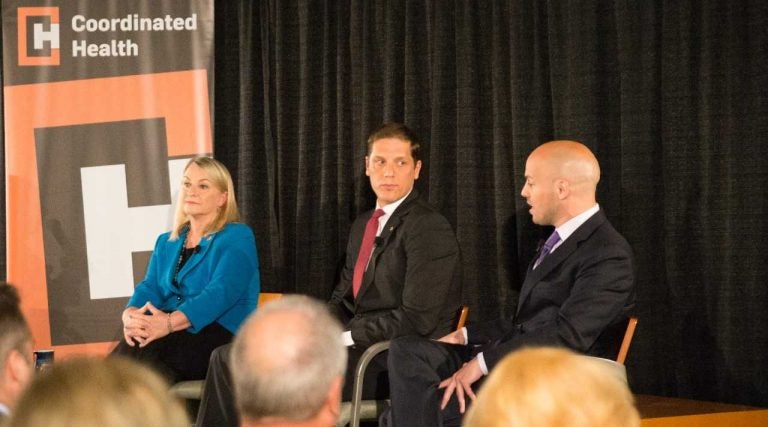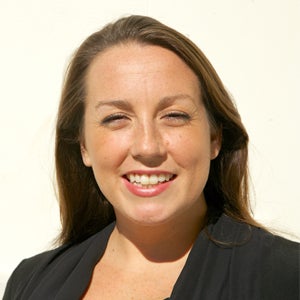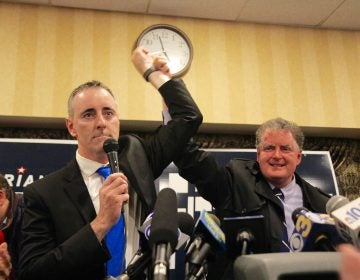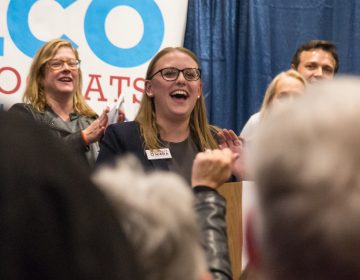Lehigh Valley candidates spar in debate over crucial congressional seat

From left, Democrat Susan Wild, Republican Marty Nothstein and Libertarian Tim Silfies are running for the House of Representatives in Pennsylvania's 7th Congressional District. (Lindsay Lazarski/WHYY)
In a race that could have national implications, candidates vying to represent the Lehigh Valley in the U.S. House of Representatives faced off in a debate on Tuesday hosted by the Greater Lehigh Valley Chamber of Commerce.
Pennsylvania’s 7th Congressional District — covering Lehigh and Northampton counties and including Allentown, Bethlehem, Easton, and the southern part of Monroe County — is considered one of the most competitive races in the country.
Differences between Democrat Susan Wild, an attorney and former Allentown city solicitor, and Republican Marty Nothstein, a Lehigh County commissioner and Olympic cyclist, quickly bubbled to the surface.
Wild supports a gradual increase of the minimum wage to $15, immigration reform, legalization of marijuana, and universal background checks for gun owners.
“I believe in equal opportunity for everyone,” Wild said. “I want to go to Washington so I can work to accomplish affordable high-quality health care for every single person, so that I can work on raising wages for the working families right here in the 7th District, so we can protect our seniors and our students.”
Nothstein said markets should determine minimum wage. He also called for better security on borders and more U.S. Immigration and Customs Enforcement agents. While he supports medical marijuana, he opposes legalizing recreational marijuana. And he touted his “A” rating from the National Rifle Association.
“This election is going to come down to a simple choice: It’s going to be results or resistance. If you want to continue with the results and what we’ve seen over the last two years, I think we know who you should vote for,” Nothstein said. “If you make the wrong decision, our economy will be headed downwards.”
The two agree, however, that the Lehigh Valley’s infrastructure needs improvement.
Also on the stage was Libertarian candidate Tim Silfies, a former television journalist. He championed free markets, the Second Amendment, and the legalization of marijuana.
The race in the 7th Congressional District became a focal point in the fight for control of the House after two big decisions this year.
First, the Pennsylvania Supreme Court declared the state’s congressional map an unconstitutional partisan gerrymander and put in place a new map that political analysts say favors Democrats.
Then, in May, incumbent Republican Congressman Charlie Dent decided to retire, leaving an open seat in a very politically competitive part of the state.
Between the two developments, national analysts say, Democrats have a slight edge as the Nov. 8 election nears.
An influx of campaign contributions and outside expenditures have also buoyed Wild’s chances. She has received more than twice as much in contributions as Nothstein, while outside groups have spent $1.3 million on ads opposing the Republican.
Gridlock
One topic that reverberated throughout the entire debate was the partisan divide that has stymied Washington.
Moderator Tony Ianelli of 69-WFMZ-TV reminded the candidates of Dent’s willingness to cross party lines, and he asked whether they would be willing to do the same.
“I think he stood as an example of somebody who was civil and dignified. Not necessarily bipartisan,” Wild said. “I think that’s what voters are really looking for — somebody who will go to Washington, behave in a civilized manner, be willing to work with people on the other side, and try to move this country forward.”
Nothstein was asked if he’d be willing to go against President Donald Trump.
“I will never be a rubber stamp for anybody. I’m an independent voice,” said Nothstein. “To me, it’s all about getting things done. Viewing things in a pragmatic way and not stopping until you get it accomplished. At times, you have to work with both sides.”
Silfies had a different take on congressional gridlock.
“It’s not about bipartisanship, it’s about nonpartisanship. Are you happy with the partisan civil war in this country? Is this helping you and your family — what’s happening right now? If you want something different, you have to vote for something different,” said Silfies. “We have to have actual independent voices who don’t answer to a party or a president.”
To complement questions of partisanship, Ianelli polled the candidates on the U.S. Senate confirmation of Supreme Court Justice Brett Kavanaugh.
Nothstein called the confirmation hearing a circus, but he said Kavanaugh is well suited for the job.
“I think it was mishandled by both sides,” Nothstein said. “I think to have Judge Kavanaugh’s life put out there as it was — was something that we should be embarrassed of as a nation.”
Wild answered with a rebuttal.
“I notice my opponent makes reference to Judge Kavanaugh having to put his life out there without mention of what Dr. Christine Blasey Ford did,” Wild said. “Her worst fear was realized that she would go out on a limb and have to speak publicly and be annihilated in the process. I read last night that she and her family still have not returned to their home because of death threats.”
Wild, however, would not say whether she would have supported Kavanaugh’s confirmation. She said, if elected, she would not back efforts to impeach the new justice or anyone else at this point.
Silfies said the confirmation process was a “sad fiasco” and an illustration of how the two-party system is no longer working.
The debate will be televised in two parts on Business Matters, a program on 69-WFMZ-TV, at 7:30 p.m. on Oct. 15 and 22.
WHYY is your source for fact-based, in-depth journalism and information. As a nonprofit organization, we rely on financial support from readers like you. Please give today.






